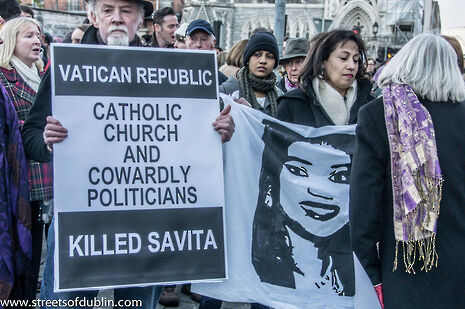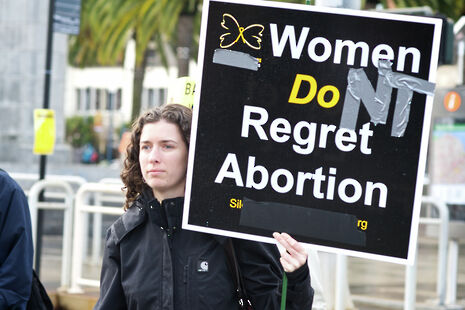I’m striking for the repeal of Ireland’s inhumane abortion laws
Helen Jennings argues that Irish and Northern Irish abortion laws create a climate of fear around pregnancy

What was your biggest fear as a child? Spiders? The dark? Mine was getting pregnant. Honestly.
From around the age of 12, I’ve been terrified of getting pregnant – and just to clarify, not only was I not having sex at that age, but I had yet to even reach the stage of physiological maturity to render me capable of childbearing.
None of this mattered, though, when faced with the prospect of what would happen should I somehow find myself in that state – the prospect faced by at least 12 Irish or Northern Irish women every day who have to travel abroad seeking an abortion. This is due to the incredibly restrictive laws governing abortion. It is against these laws and in respect for these women that I will be joining with fellow Irish women and our allies at Cambridge Guildhall this Wednesday 8th March at noon to engage in direct action.
Abortion is currently illegal on the island of Ireland, with the UK Parliament’s 1967 Abortion Act not extending to Northern Ireland, and the 8th Amendment to the Constitution of the Republic of Ireland enacting an effective ban on any termination procedure by equating the life of the unborn foetus to the life of the mother. Abortion is not available across Ireland in cases of rape, incest or fatal foetal abnormality. (Where the child has no chance of survival outside the womb, women are forced to carry these pregnancies to full term, often with devastating psychological effects.)
In both regions, the only circumstances under which an abortion can be carried out is if the pregnancy raises an “imminent and substantial threat” to the mother’s life. Such a “threat” is left undefined, meaning that doctors are left in the position of having to judge if a woman is ‘close enough to death’ for the procedure to be carried out, or risk breaking the law. Even then, this single exception was only legislated for in the Republic in 2013, following media and public outcry over the tragic death of Savita Halappanavar, which came after she was refused an abortion in a Galway hospital.
“I would panic, convincing myself that this was a modern-day Virgin Birth. I was with child and the Pope better be called”
So I was terrified. If I had gotten pregnant at home in Northern Ireland I would have had few options, each worse than the last. I could risk ordering pills online, knowing that if I was discovered attempting to procure an abortion I could realistically at least expect a suspended sentence, at most life in prison.
Where does that leave me? When, aged around 14 (still not having had sex, by the way), I asked my mother if she would support me in either of the aforementioned options, her answer was simply ‘no’. In the kindest way, my feminist, breadwinner and businesswoman mother explained to me that should I ever get pregnant I’d just have to keep it – but don’t worry, she’d raise it for me so I could go to university like I’d planned! That night, I cried myself to sleep.

When my period finally came at the age of 14, I breathed a sigh of relief. This feeling of relief is one which overwhelms me every time I see the telltale signs of oncoming menstruation. It’s my favourite time of the month. It means I’m safe. This relief is similarly felt whether or not I’ve been sexually active. Whenever I would miss periods as a young teenager, as my body started to regulate itself, I would panic, convincing myself that this was a modern-day Virgin Birth. I was with child and the Pope better be called, because clearly I was the new Holy Mother. Can you tell I was raised Catholic?
Ireland is a nation that has broken so many barriers, from successfully recovering from post-2008 bankruptcy to become a thriving centre of European and international commerce, with one of the most sought-after workforces worldwide, to being the first nation to legalise same-sex marriage by popular vote. It seems as if abortion laws in the Republic of Ireland is the last grip of the past, manacled around the nation’s ankles to hold back the tide of progress.
The prospect of reform in the North is not a likely one. Despite a declaration of incompatibility with the European Convention on Human Rights handed down in 2015, change is not on the horizon. The law governing abortion in Northern Ireland is in the hands of our legislators, and out of 100 members of the legislative assembly elected just this past Thursday, only three are explicitly pro-choice in all circumstances.
In the Republic, however, there is hope, and growing momentum. Tomorrow, thousands of Irish women and allies at home and abroad have vowed to undertake direct action. We will strike in response to the Irish government’s refusal to call a referendum on the 8th Amendment. The Strike4Repeal movement urges women to “Meet me on the bridge” – at 12 noon, the striking women of Ireland will meet on Dublin’s O’Connell bridge to show their solidarity with the 12 women who will have been forced to travel abroad for an abortion on that day alone.
I choose not to live in fear anymore. On 8th March at 12 noon, meet me on O’Connell Bridge. Meet me at the Irish Embassy in London, or the Irish Consulate in New York. Meet me at protests in Brussels and Buenos Aires.
On the 8th March at 12 noon, meet me at Cambridge Guildhall. Wear black. Strike for repeal
 News / Caius mourns its tree-mendous loss23 December 2025
News / Caius mourns its tree-mendous loss23 December 2025 Comment / Yes, I’m brown – but I have more important things to say22 December 2025
Comment / Yes, I’m brown – but I have more important things to say22 December 2025 News / Clare Hall spent over £500k opposing busway 24 December 2025
News / Clare Hall spent over £500k opposing busway 24 December 2025 Interviews / Politics, your own way: Tilly Middlehurst on speaking out21 December 2025
Interviews / Politics, your own way: Tilly Middlehurst on speaking out21 December 2025 News / King appoints Peterhouse chaplain to Westminster Abbey22 December 2025
News / King appoints Peterhouse chaplain to Westminster Abbey22 December 2025








